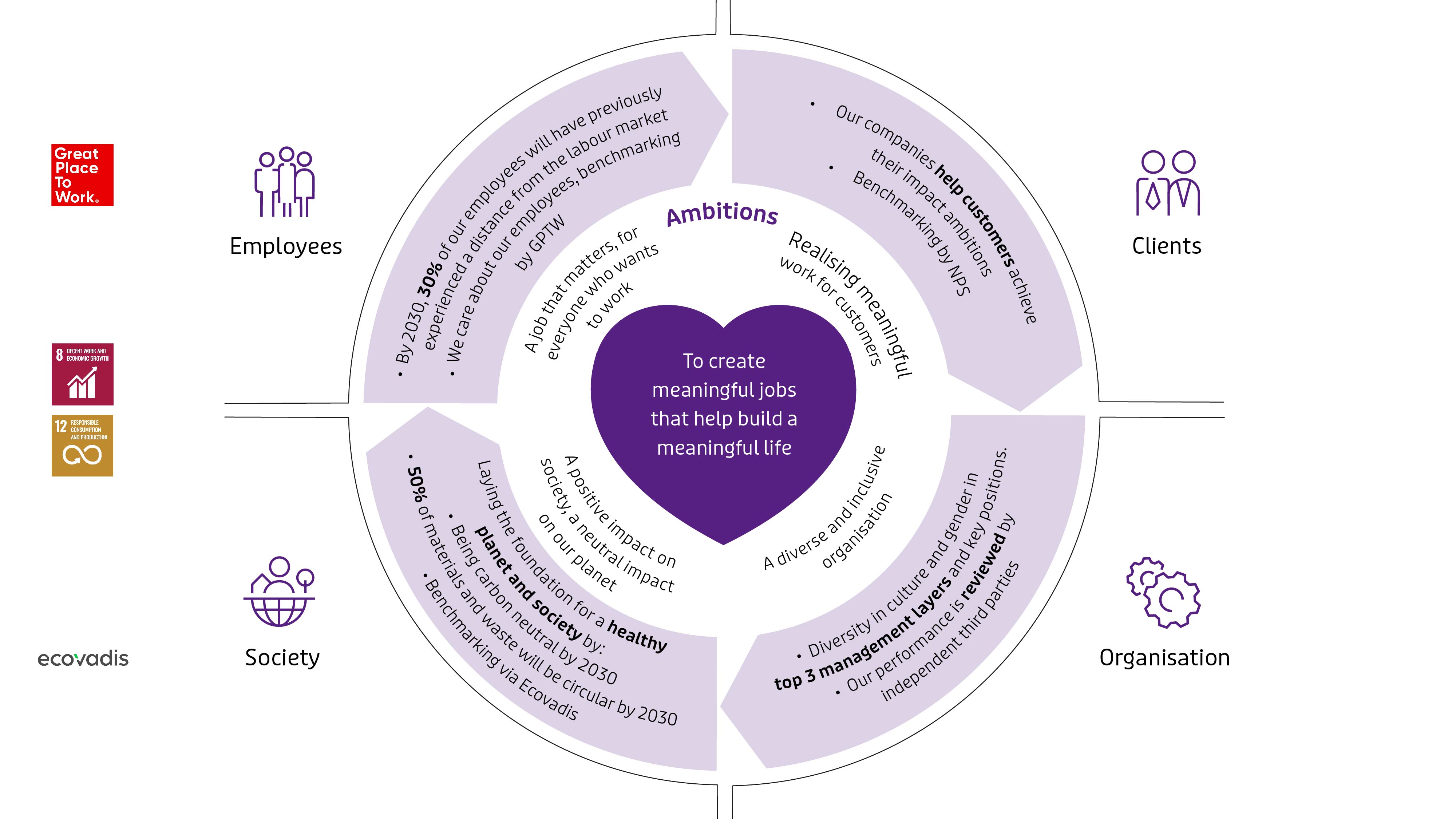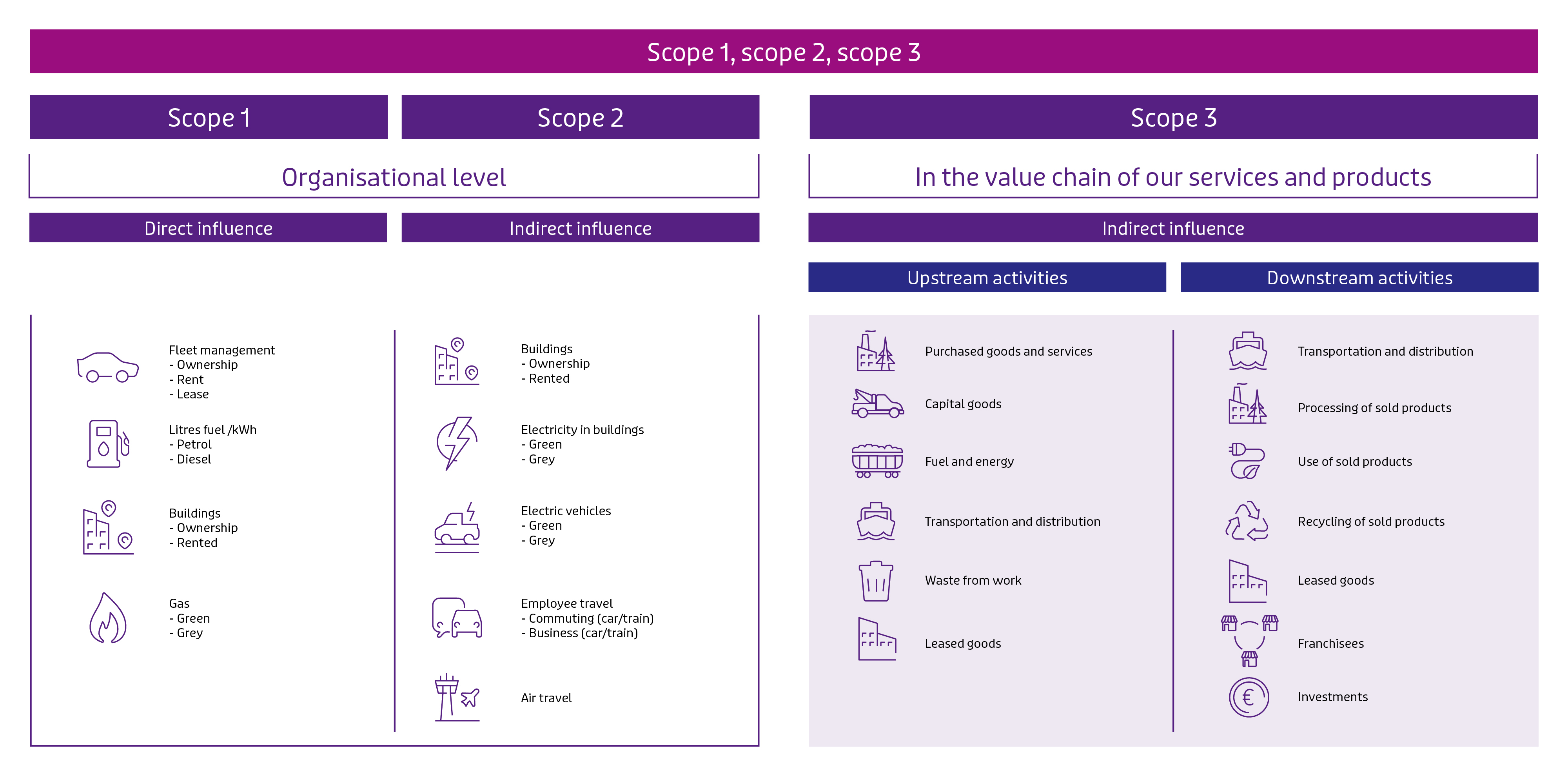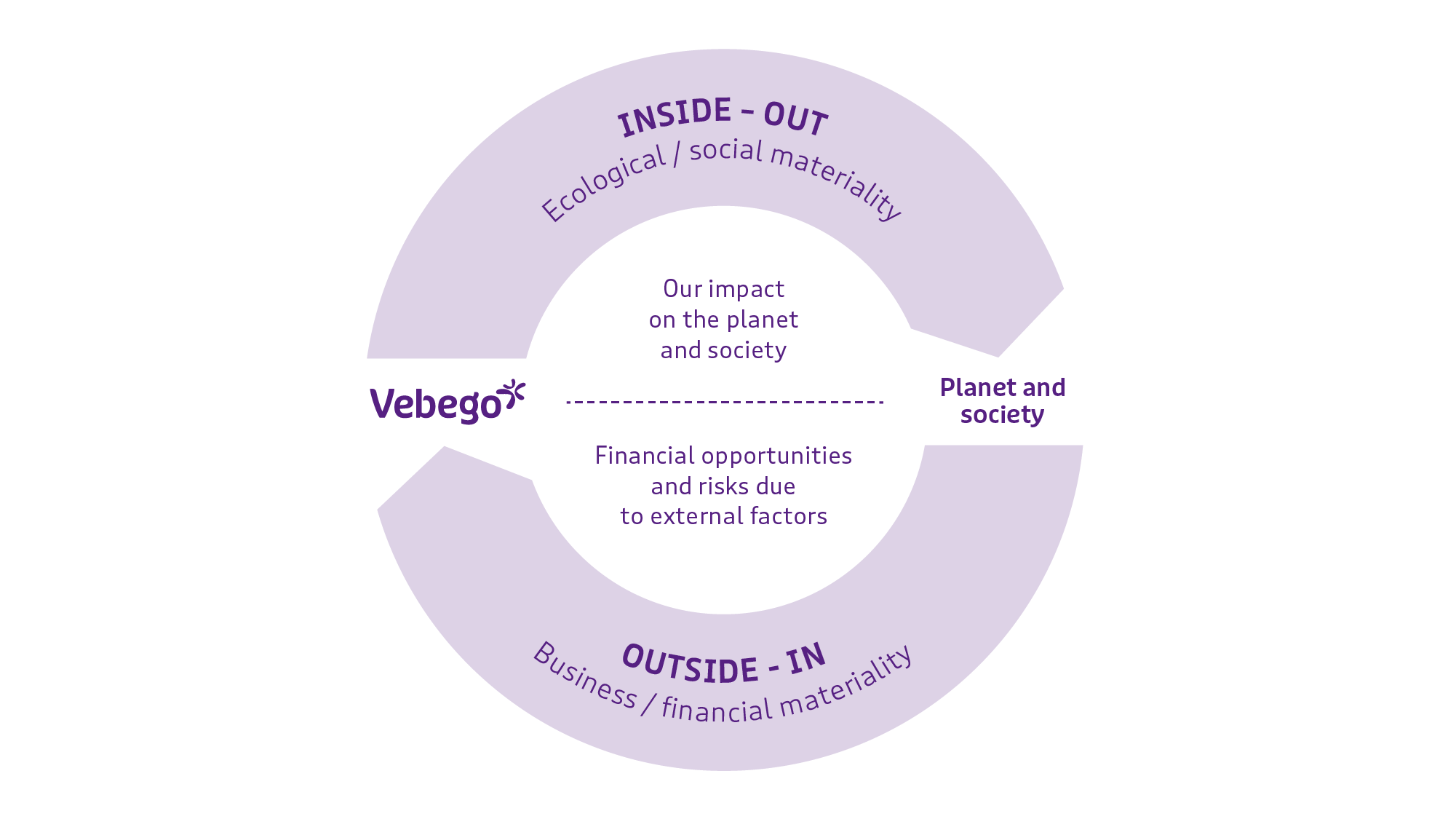Impact strategy
Our impact strategy is part of the overall strategy. And has the following key principle: Vebego wants to do well and make a positive impact on people, the environment and society. We want to be part of the solution, and be a company where everybody feels welcome. And contribute positively to people’s lives and the future of our planet, with everything in our power.
Being sustainable and distinctive
A solid impact strategy helps us in our mission, the creation of meaningful jobs. It's part of it. Clients are also increasingly asking about the sustainability of our business operations. And with the laws and regulations that are in place and forthcoming (Climate Accord, EU Green Deal, CSRD, please see further on in this section), a multi-year impact strategy that ensures we make, measure and achieve our sustainability goals transparently is also appropriate. That also means accountability and explaining why an objective may not have been achieved. Something similar applies to our ambition to be a Great Place To Work. An ambition that is intrinsically driven, while at the same time aligning with the need to be distinctive as an employer in a labour market that is extremely tight in all the countries where we operate.
Strategy refined and defined
In 2022, we further refined and outlined our impact strategy. For our four key stakeholders – employees, clients, society, our own organisation – we have outlined the impact we want to make, what our objectives are, and how we further shape, measure and monitor our progress in these areas. This is illustrated in the visual below.

Vebego's impact strategy
At the centre of the visual is our mission, the higher purpose which our hearts go out to, creating meaningful jobs that help build meaningful lives. We added our ambitions for all four stakeholders, in the inner circle. The outer ring describes how we will shape this ambition specifically, and how we will measure and guarantee our progress in doing so.
KPIs formulated for 2023
In addition, in 2022 we also formulated concrete KPIs for 2023 in our impact objectives. These KPIs are:
KPI 2023 for the CO2 neutral target by 2030: company-specific roadmap 1 April All Vebego companies will create a company-specific roadmap before 1 April 2023, containing the reduction targets, over the currently measured scope, to be CO2 neutral by 2030.

Scope 1-2-3
That’s why we mapped CO2 emissions across all our businesses in 2022. Together with Climate Neutral Group, we organised nine kick-off workshops for this. In these sessions, the companies were included in Vebego's Impact Strategy, the why of the strategic CO2 neutral programme, the three scopes with the different CO2 emission sources, and the generic roadmap.
As a KPI for 2023, we have determined that the companies will deliver their company-specific roadmap to the Impact Team by 1 April 2023. The roadmap includes all necessary reduction measures towards 2030, based on the current measured scope. The Impact Team assesses the roadmap for accuracy and feasibility, with the help of Climate Neutral Group. Responsible for this KPI are our COOs.
KPI 2023 for the objective circular business by 2030: company-specific roadmap by 1 October Vebego strives for maximum renewability, longevity, optimal use or reuse, renovation, remanufacturing, recycling of cleaning equipment and biodegradation of cleaning products. We do this to preserve the value of the resources, products and materials. Our circular business objective is for 50% of our material use and waste to be circular by 2030. As KPI for 2023, it has been determined that the companies will submit a company-specific roadmap for a circular business model to the Impact Team no later than 1 October 2023. Our COOs are responsible for this KPI.
KPI 2025 for the vertical diversity and inclusion objective Vebego wants to increase the diversity in gender and cultural background in the three top layers and in key positions. As a KPI, it is determined that in 2025, at least 33% will be female in this specific category. The number of people with a cultural background other than the total is at least 10% in the same category by that time. Responsible for this KPI is our Chief People & Culture Officer. Based on an employee scan with indirect employees and team leaders, and a policy scan, Vebego had a baseline measurement carried out by the Dutch Inclusion Monitor in 2022. Subsequently, recruitment and application processes have been and will be evaluated to promote gender and cultural diversity.
KPI 2023 targetting a workforce of which 30% is recuited from demograpohic groups distanced from the labour market by 2030 Vebego has the objective that 30% of employees have previously had or experienced a distance to the labour market by 2030. Who these ‘MAA’ are (people distanced from the labour market) is partly determined by local laws and regulations. Vebego uses this as a general definition: People with distanced from the labour market are those with a reduced ability to work due to physical, mental, medical, social, educational or economic impairments, and who have therefore been unemployed for more than a year. These are people with disabilities or illnesses that hinder their ability to work, people with little or no education, lack of work experience or a criminal background, and/or people who face language barriers and/or transport difficulties or other obstacles. Based on this definition, an agreement will be made in 2023 for each business unit’s contribution to our 2030 goal. Responsible for this KPI is our Chief People & Culture Officer.
Working towards CSRD
In 2022, Vebego started working towards ‘CSRD’: Corporate Sustainability Reporting Directive. This new EU Directive requires large, listed companies (from 2024) and large companies such as Vebego (from 2025) to report on the impact of their business activities on people and the environment. The new guideline expands the reporting requirements to include more topics. Companies should also report on their impact on climate change, social and human rights, diversity and inclusion, and anti-corruption, among others.
Preparations for CSRD help us gain an even better view of our environmental and social performance and sustainable business practices. It helps us identify areas for improvement and implement measures that reduce our environmental footprint and increase our social impact. It also helps us better manage potential risks and take advantage of opportunities related to sustainability.
Major steps taken with materiality analysis
Certain sustainability topics are mandatory to report on. But there are also sustainability themes that are relevant to our own organisation/industry. To determine the importance of these, both internal and external stakeholders are involved in a materiality analysis. This concerns topics in the area of ESG (Environment, Social, Governance) that the company has an impact on or is influenced by.

Materiality
Inside-out, outside-in In preparation for CSRD, Vebego, together with an external consultant, took major steps in 2022 in making a materiality analysis for its own company. We have looked at the positive and/or negative impact Vebego has on people and the environment (inside-out). And what the financial opportunities and risks of external factors are on Vebego (outside-in). What is the financial impact on Vebego from, among other things, climate change, labour market and raw material shortages?
Fixed format and mandatory components The CSRD reports are prepared in a fixed format and always contain information about general business matters such as governance, strategy, risk management, statistics and objectives. In addition, there are two main topics that all companies are required to report on, climate change and their own workforce.
Company-specific themes In addition to these mandatory components, each company also identifies company-specific themes as part of the materiality analysis. Vebego largely surveyed these topics in 2022 based on an internal and external stakeholder analysis. This concerns topics such as biodiversity, circularity, diversity and governance. These are all issues that really matter to Vebego and which Vebego also prioritises in its actions.
Next steps: GAP analysis in 2023 Thanks to the materiality analysis, which we will complete in 2023, we have gained a better understanding of what we still need to do in preparation for CSRD. In 2023, as the next step, a GAP analysis will take place for Vebego's eleven large companies. Now that we know what data we need over time, we will explore what needs to be ready in two years’ time, what we already have, and what needs to be set up.
